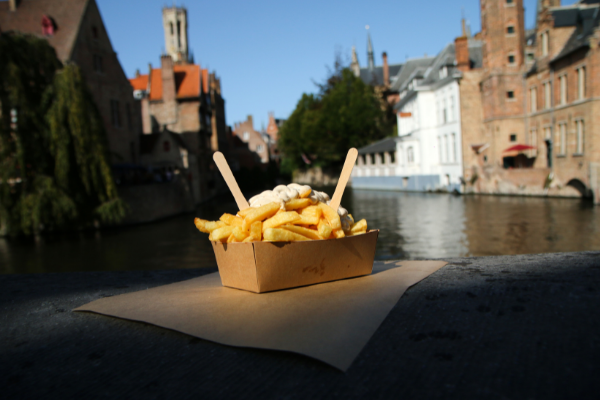Belgium's frituurs (the chip shops for which the country is renowned) are feeling the heat as Russia’s invasion of Ukraine is putting a halt on the country’s sunflower supply.
Three-quarters of sunflower oil in Europe originates from Ukraine and Russia, with Ukraine accounting for nearly half (200,000 out of 435,000 tonnes) of the continent's sunflower oil supply.
“It’s currently all hands on deck with the potato processors,” said Christophe Vermeulen, the CEO of sector federation Belgapom.
The war has had a significant impact on Europe’s imports already, with empty supermarket shelves and high prices, but it is bound to get worse. “At the European level, there is only a few months' worth of supply left,” said Nicholas Courant of the food federation FEVIA to De Morgen.
Sunflower oil is key to the whole frites industry – not only for the chips themselves but also for the different sauces.
4,500 different oils
However, sunflower oil isn't the only way to make irresistible Belgian frites. The owner of Maison Antoine, a popular friterie in the European quarter, told Politico that sunflower oil is mainly used for pre-fried or frozen potatoes, whereas their fresh potatoes are cooked in beef fat.
Bernard Lefèvre, a former chip shop owner and head of independent trade association Unafri, explains that every frituur has its own unique recipes, made with a myriad of ingredients. “There are over 4,500 fry stands in Belgium and they all needed to be different from each other. This means we are globally less dependent on a single source of supply.”
Related News
- Toilet paper to tomatoes: these products now more expensive in Belgian stores
- 'Frites Oscars' spark controversy with no Brussels frituurs making the cut
- Ukraine war: Will EU impose sanctions against import of Russian natural gas?
While that means sunflower oil is generally one of many ingredients used, coming by alternatives isn’t easy at the moment. Rapeseed, soy and palm oil are also experiencing shortages due to drought in South America and export restrictions in Indonesia, and prices are skyrocketing.
No quick fix
Even if alternative oils were readily and cheaply available, replacing sunflower oil at such short notice demands a complex logistical operation because of the strict rules on packaging and food safety.
Nicholas Courant of the food federation FEVIA explains that the process of complying with the rules and testing the taste and texture is a process that normally takes a year. “Now it would have to be done in a few weeks. That is a mission impossible,” he told De Morgen.
For smaller, independent friteries like Maison Antoine, the main concern is that the industry's big players will bulk buy other types of vegetable oils, potentially limiting the availability for smaller businesses.
Consumers to swallow the price rises
The constrained supply of oils in combination with the ongoing energy crisis in Europe will inevitably make your favourite Belgian fries more expensive. Frituur owners, alongside greenhouse growers and other sectors, are already struggling with high energy bills.
Philippe Burny, agro-economist at the Walloon Agricultural Research Centre, told Politico that prices were likely to jump. “If the industry has to make adjustments, there will be costs,” he said.
The jump in prices is representative of Belgium's economy as a whole. “We are, in a way, the thermometer of Belgian society. It’s true that the mood right now is not the most cheerful. That being said, a nice cornet of fries always does you good,” Lefèvre said.

